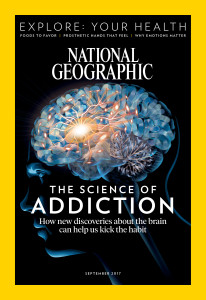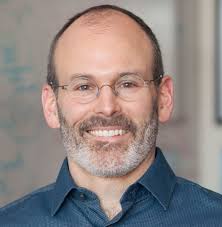 This coming Sunday, July 8, will be the ten-month anniversary of my last drink. I first wrote about this in my final blog post of 2017, “0 Meetings in 90 Days,” when I wrote about how I quit drinking on September 8, 2017.
This coming Sunday, July 8, will be the ten-month anniversary of my last drink. I first wrote about this in my final blog post of 2017, “0 Meetings in 90 Days,” when I wrote about how I quit drinking on September 8, 2017.
I did a follow-up post three months later, on my 67th birthday, “Birthday Musings: People Can Change #sixmonthswithoutadrink”. And again in January, “120 Days….”
I was talking with a friend about this yesterday and she mentioned an article she found interesting from the September 2017 issue of National Geographic Magazine, “How Science is Unlocking the Secrets of Addiction” by Fran Smith. My friend loaned me her copy of the magazine and I read the article this morning.
While I found much that was helpful and interesting in the article—which wasn’t just about alcohol and other drug addictions, but also touched on addictions to food, shopping, and other behaviors—I took issue with the author’s definition of addiction as a disease. Although she presented a broad brush view of treatments, she seemed to agree with the Alcoholic Anonymous template when it comes to approaching alcoholism as a disease. I didn’t take issue with the plethora of treatments that are being studied to help people who are addicted to addictive substances, only with defining addiction as a disease. (One of the things that resonated with me about Annie Grace’s book, This Naked Mind: Control Alcohol, Find Freedom, Discover Happiness, & Change Your Life, was her focus on alcohol as the extremely addictive drug that it is, rather than a focus on the “alcoholic” as a sick person.”)

Smith did part ways with AA on some important tenets in her National Geographic piece, though, and offered an alternative that touched on some of what works for me:
“Although 12-step programs, cognitive therapy, and other psychotherapeutic approaches are transformative for many people, they don’t work for everyone, and relapse rates are high…. [Judson]Brewer is a student of Buddhist psychology. He’s also a psychiatrist who specializes in addiction. He believes the best hope for treating addiction lies in melding modern science and ancient contemplative practice. He’s an evangelist for mindfulness, which uses meditation and other techniques to bring awareness to what we’re doing and feeling, especially to habits that drive self-defeating behavior….
Researchers at the University of Washington showed that a program based on mindfulness was more effective in preventing drug-addiction relapse than 12-step programs….
Mindfulness trains people to pay attention to cravings without reacting to them. The idea is to ride out the wave of intense desire.
That’s pretty much what I’ve been doing for the past ten months—riding out the wave of intense desire. Yes, the desire for a vodka martini is sometimes still intense, but the good news is that I don’t have those desires as often as I did when I was drinking. I used to crave vodka pretty much all day, every day. Now I only crave it a few times a week, sometimes less. I actually have whole days without that craving, which is wonderful.
But when it comes, I use a combination of mindfulness and prayer to ride out the craving. Sometimes I even talk to myself aloud, saying things like, “Yes, that martini sounds wonderful, and would certainly take the edge off this emotional or physical pain I’m having right now, but one wouldn’t be enough. I would want two. Or three. And the next time I’m in pain—which is a daily thing for me—I would want alcohol again. So why go there?” Sometimes I do things to counter the intense desire. Things like exercise, or a “treat” like something sweet or taking a break from work to watch TV or read a good book. All of these things help, but the mindfulness and prayer are the main things keeping me from drinking.
As I’ve written about here before, I’m still struggling to learn to apply these same tactics to my struggles with food cravings. The main problem remains: one cannot quit eating; one has to learn to be moderate with food. I’ll close with an encouraging quote from the National Geographic article about a woman who is having some success with mindfulness and eating:
Donnamarie Larievy, a marketing consultant and executive coach, joined the weekly mindfulness group to break her ice cream and chocolate habit. Four months in, she eats healthier food and enjoys an occasional scoop of double fudge but rarely yearns for it. “It has been a life changer,” she says. “Bottom line, my cravings have decreased.”
I always love hearing from my readers on your experience in these areas. Please leave a question or comment here, or in a thread on Facebook. Thanks always for reading!
I’m sober now 40 years and have had the privilege in my practice as a psychotherapist and nurse practitioner to work with hundreds upon hundreds of people with addictive disorders. If we had not categorized this as an illness these people would not have access to treatment. This is not the only rationale, if one studies the changes in all the body’s systems over time with use of alcohol and other mood-altering chemicals, one sees numerous pathophysiologic changes. And for most, the idea of ‘illness’ reduces the shame. That being said, I 100% agree with you that there is no ‘one size fits all’ approach. If someone had said to me 40 years ago I had to go to AA I would never have done it and who knows where I’d be today. I swam laps. I guess it was my contemplative practice. I added a lap a day until I reached a mile. That mile was a turning point, for sure. I feel so happy reading your blog today. It reinforces my belief in the human spirit.
I’m sober now 40 years and have had the privilege in my practice as a psychotherapist and nurse practitioner to work with hundreds upon hundreds of people with addictive disorders. If we had not categorized this as an illness these people would not have access to treatment. This is not the only rationale, if one studies the changes in all the body’s systems over time with use of alcohol and other mood-altering chemicals, one sees numerous pathophysiologic changes. And for most, the idea of ‘illness’ reduces the shame. That being said, I 100% agree with you that there is no ‘one size fits all’ approach. If someone had said to me 40 years ago I had to go to AA I would never have done it and who knows where I’d be today. I swam laps. I guess it was my contemplative practice. I added a lap a day until I reached a mile. That mile was a turning point, for sure. I feel so happy reading your blog today. It reinforces my belief in the human spirit. BTW I used that article in a training, I think it covers a lot of territory in one piece.
Hi, Nina. Thanks so much for this… I was hoping to hear from you and I value your professional and personal opinion very much. You’ve made some good points here and I’m glad my readers have the opportunity to hear from you. (By the way, for some reason your comment posted twice… the first time without your final sentence. I’ll see if I can delete that one.)
I have never really understood the attempts to either place AA on the pedestal as the only way to recover from addiction or to demonize it as a cult. I have been sober for over 30 years. AA was absolutely instrumental to me very early in the process. I have come to understand that my addiction to alcohol and drugs was but a symptom of my refusal to live life on life’s terms. That was an essential starting point.
Over time that has led me in many different directions including mindfulness. For example, I am currently enrolled in a course on Cultivating Compassion that was created by Thupten Jinpa, The Dalai Lama’s Translator. The course is steeped in mindfulness practice and Buddhist thought. Also, I am very active in the interfaith School for Contemplative Living here in New Orleans. I consider these practices integral to my ongoing recovery from addiction.
For me, the trajectory for these directions are based in my experience with Alcoholics Anonymous – particularly Steps 3 & 11. I am consistently pleased with how in book discussions, whether those of the Franciscan Richard Rohr, the Christian mystic tradition such as in the Cloud of Unknowing, the Buddhist practitioners from Thich Nat Han to the Dalai Lama, I find very strong connections with the experience, strength, and hope I also continue to receive in the Twelve Step Program.
In the past year I have been diagnosed with Stage 4 cancer. The initial prognosis had me dead by last Christmas. I continue to amaze my oncologist that I am doing so well – without any chemo or radiation to date. To make a long story short, about one month ago I came across a study of 1500 Stage 4 cancer patients who had gone into remission either without or after traditional western medicines had failed. The author of the study listed 9 things that all 1500 patients who had gone into remission did. I looked at the list and realized those were all things I did too on a regular basis. This was perhaps one of the explanations of why I was doing better than my oncologist expected. I note too that all nine of the actions are those I have taken on in recovery and trace back to my early days in AA.
My life is blessed today by a cornucopia of resources in which to live, from AA and beyond. I cannot imagine an either/or scenario of having to choose one over the other.
Hi, Robert. I’m so glad you commented here, as you have so much wisdom to share with me and my readers. I hope I wasn’t “demonizing” AA as a cult in my post. I love how you have taken what works from the 12 Steps program AND your in depth study and practice of mindfulness to make yourself so healthy! It’s pretty amazing, and I am so thankful for how well you are doing! Thanks for commenting.
I am so impressed with you, Susan. You have written beautifully about the subject of addiction and generated a profound conversation. I enjoyed reading this and applaud those who have commented as well! Keep up the wonderful work!
Thanks, Claire. Nina Gaby and Robert Connolly are both people whose opinions I respect greatly, so I”m thrilled that they jumped in here. Nina has an essay in my first anthology, A SECOND BLOOMING: BECOMING THE WOMEN WE ARE MEANT TO BE, and I have an essay in her anthology, DUMPED: STORIES OF WOMEN UNFRIENDING WOMEN. All her publications can be found here: https://ninagaby.wordpress.com/portfolio-of-recent-work/portfolio-of-recent-work/publications/